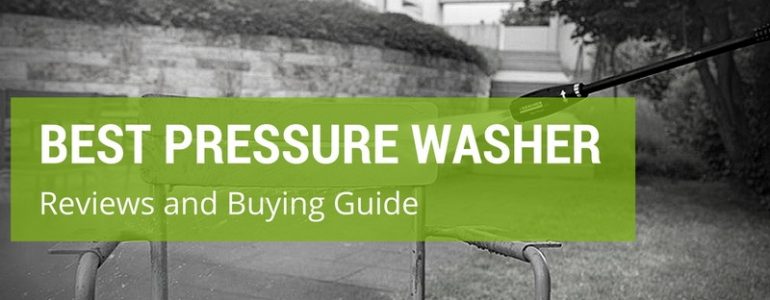Whether it’s the dry season or a wet winter, dirt never takes a break. If it’s dry, you can expect to find dust and debris all over the compound. But the rains really encourage the buildup of mud and grime. Nobody wants to spend hours trying to clear out the driveway or rid their vehicles of every spec of dirt, especially if you don’t have the right tools.
Fortunately, there are solutions that make cleaning much quicker, easier and highly efficient. When it comes to outdoor cleaning and maintenance, only the best pressure washers will do. Here are a few quick pressure washer reviews that should help you get done with your cleaning sooner.
Best Pressure Washer Reviews – My Top Picks
Best pressure washer for patios and deck: The Karcher K4 Full Control Pressure Washer
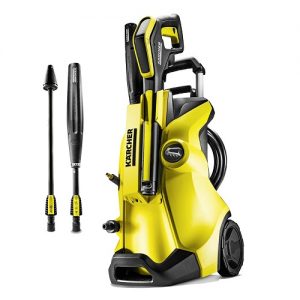 With all new updates from the manufacturer, the Karcher K4 Full Control Pressure Washer comes to you in a black and yellow sleek, attractive and futuristic design.
With all new updates from the manufacturer, the Karcher K4 Full Control Pressure Washer comes to you in a black and yellow sleek, attractive and futuristic design.
One of the strongest selling points of the K4 include full control vario and dirt blasters that allow for the right pressure for different cleaning surfaces.
With an 1800 Watt motor and pressure levels as high as 130 bars, nothing can defy the power of the machine. Other features like the LED display on the trigger helps make cleaning easier and more accurate.
Karcher was also kind enough to incorporate on board storage for all those accessories. However some customers retain that the hose and cable storage section feels a bit flimsy, so be gentle.
Read my review of the Karcher K4 Pressure Washer.
Best pressure washer under 100: The Bosch AQT 40-13 Pressure Washer
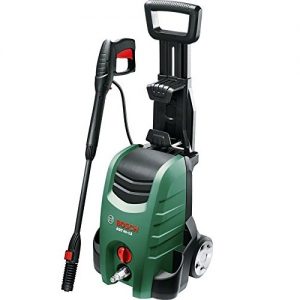 Efficient, versatile and a convenient cleaning solution, the AQT 40-13 is one of the most powerful pressure washers from Bosch.
Efficient, versatile and a convenient cleaning solution, the AQT 40-13 is one of the most powerful pressure washers from Bosch.
In addition to an elegant black and green exterior, this washer packs quite the punch under the hood.
The 1900 watt motor generates up to 130 bars of pressure that makes for an unyielding flow rate of 400 litres per hour.
The Bosch AQT 40-13 Pressure Washer is not only super affordable, but is also ideal for barbeque grills, patios, driveways, outdoor furniture, cars, bikes and any other surface that can withstand a good hose down.
Customers are however advised to be gentle with the unit since some fittings are not as sturdy.
Read my review of the Bosch Pressure Washer.
Best pressure washer for home and driveways: The Nilfisk D-PG 140.4-9 Xtra 140 Bar Dynamic Pressure Washer
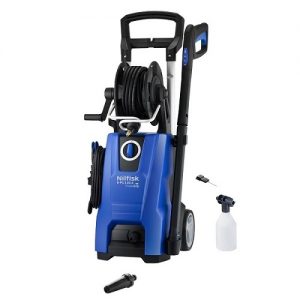 Easily recognised as one of the most advanced and feature-packed washer, the Nilfisk D-PG 140.4-9 Xtra 140 Bar Dynamic pressure washer is perfect for tough to clean surfaces such as driveways, patios and your home as well.
Easily recognised as one of the most advanced and feature-packed washer, the Nilfisk D-PG 140.4-9 Xtra 140 Bar Dynamic pressure washer is perfect for tough to clean surfaces such as driveways, patios and your home as well.
Do not be fooled by the aesthetically pleasing black and blue exterior; this bad boy is as mean as they come. From medium to more high-frequency cleaning around your home, the unit promises performance and durability all through.
At a staggering 2400 Watt motor, this is definitely one of the most powerful washers.
The additional power generates 140 bars of pressure and sprays water at a rate of 550 litres per hour. Just be prepared to part with a pretty penny to enjoy all that Nilfisk has to offer.
Read my review of the Nilfisk Pressure Washer.
Best pressure washer for cars and bikes: The Hilka RAC-HP221 RAC Pressure Washer
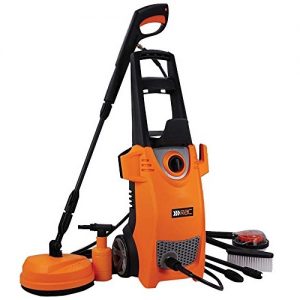 Boasting of super compact and lightweight construction, the Hilka RAC-HP221 RAC Pressure Washer is ideal for scenarios where manoeuvrability is crucial.
Boasting of super compact and lightweight construction, the Hilka RAC-HP221 RAC Pressure Washer is ideal for scenarios where manoeuvrability is crucial.
This means areas that involve jet washing bikes, cars, RVs, motor homes and lots of other surfaces. The black and orange exterior houses a 2000 watt motor that gives out 140 bars of pressure and 6.7 litres a minute.
Hilka was thoughtful enough to incorporate a wheeled chassis that helps the 11 Kg machine achieve more mobility.
Thanks to the endless array of accessories, you should be able to get the job done easy. On a downside, the assembly may prove a bit tough, but once you get it together, it’s smooth sailing all the way.
Read my review of the Hilka Pressure Washer.
Best budget pressure washer: Makita HW101 Compact Pressure Washer
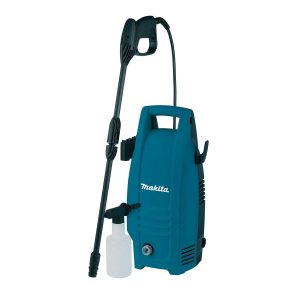 Although the Makita HW101 Compact Pressure Washer is an entry level pressure washer, it can be a great addition to the UK households that need an inexpensive but good quality pressure washer.
Although the Makita HW101 Compact Pressure Washer is an entry level pressure washer, it can be a great addition to the UK households that need an inexpensive but good quality pressure washer.
There is nothing wrong with an appliance that actually does the one job it’s meant to do perfectly.
It’s a hardy and reliable machine that will help with small to medium DIY cleaning jobs at home without much fuss.
Of course, it’s not completely without its faults (like that weight to power ratio), but if you take good care of Makita HW101, it will last a very long time and take great care of your home and properties.
Read my full review of the Makita Pressure Washer.
Pressure washer buying guide
Learning the basics about buying the best product will help you to clean more of the surfaces around your home more thoroughly. Choose the right machine and you make quick work of all those difficult cleaning jobs. Although most pressure washers share similar functionality, slight differences in one model washer to another could make a big difference.
The basic premise behind is that water enters the machine at a very low pressure, then the motor drives the water through a hose then spray tip at a very high pressure. Choosing the right pressure washer will allow you to efficiently clean a large variety of those outdoor items.
Electric pressure washers
If you are looking for a washer that will clean light projects like your sidewalks and patio furniture, the best pressure washer for you might be electric. The electric pressure washer are lighter and quieter than their gas counterparts. Plug in the cord and with the flip of a switch your pressure washer is running.
There is no need to add gasoline with the electric pressure washer, just be certain to follow the manufacturer’s instructions when it comes to connecting the device to a power source. The electrical connections need to be kept dry and well off the ground, so be careful plugging and unplugging the unit with wet hands.
Gas pressure washers
When you need a unit that will clean much more challenging home projects like the siding on the house, garage floor, driveway, or your fence, the best pressure washer for you would be the gas powered pressure washer. With the gas powered unit, you have much more mobility because you are not confined to the length of the power cord.
They crank start, similar to the pull-start on a lawnmower, or come with electric starter buttons. Be certain you read the manufacturer’s specifications as to the type of fuel your washer requires. The right mix of fuel will ensure you get many years of use and your washer runs properly.
The capabilities
The pressure washer will range in capability from light-duty to heavy-duty. Choosing the right model will ensure that the projects around your home are cleaned efficiently. The pressure output is rated in bars, the determining factor in which kind of specific jobs the pressure washer can handle easily.
The light-duty pressure washer (100 Bars)
The light-duty pressure washer work best for cleaning garden furniture, outdoor toys, barbecues, sidewalks, motorbikes, stairs, bicycles, rubbish bins, and even decks. The bars are low enough that you can wash your vehicle without concern of stripping away paint or damaging the surface.
The medium-duty pressure washer (100-110 Bars)
Medium-duty pressure washers are excellent for cleaning stained decks, driveways, fences, guttering, boats, lorries, hot tubs, and the siding on the house. The bars in the medium-duty pressure washer allow you to remove stubborn stains on sidewalks or decks easily.
The heavy-duty pressure washer (110-130 Bars)
The most powerful of the pressure washers, the heavy-duty model will clean the surfaces of brickwork, sidewalks, driveways, decking, farm equipment, just about anywhere stain removal is required. The pressure washer can also be used to prepare a surface like a fence before it is painted.
Specifications and features
By understanding a few of the popular terms related to the pressure washer, it will better help you understand which machine can handle those cleaning jobs around your home. This is not complicated by any means, these terms are designed to make your decision easier.
Maintenance free pumps means the system will have a greater efficiency and longer life expectancy, perfect for the homeowner who intends to use their machine frequently. Interchangeable tips or nozzles change the flow of water and therefore make cleaning certain items easier.
Narrow spray tips provide less coverage but higher pressure, tips with wider sprays have lower pressure and greater coverage. The adjustable wand allow you to adjust between pressures without having to change the tips. Injection simply refers to the ability to allow detergents or chemicals into the water spray by either a siphoning tube or on-board tank.
The accessories
The best pressure washer will come with accessories that work with the machine to help you clean surfaces more easily. Before choosing your pressure washer, consider some of these accessories dependent on the types of projects you will be doing frequently around the house.
Brushes are great accessories for letting you apply some extra scrubbing power to cleaning sidewalks, driveways, and decking. The extension wand and the spray tip are excellent for reaching second stories, guttering, and those areas simply out of reach. Angled wands are specifically designed to clean hard to reach areas like inside gutters more easily.
The surface cleaners with the spinning jets make cleaning stubborn stains off garage floors, sidewalks, and driveways much easier. There are also different types of cleaning chemicals, be sure the cleaners you use are compatible with your device. Many different pressure washers require specific chemicals in order to be effective.
Using your pressure washer
Now that you understand the basics of these devices, it is time to get out there and start cleaning. Be sure that you are always standing on a stable surface when operating the machine, solid footing and good balance are important when working with water and slippery surfaces.
Be sure you always wear eye protection when operating your pressure washer, debris will be moving at high rates of speed and could cause significant eye injury if you are not wearing adequate protection.
Be sure that you never leave the spray gun unattended while your pressure washer is still running. Pay close attention to the manufacturer instructions, the correct spray setting and nozzle will ensure your are not applying too much power that could damage the cleaning surface. Absolutely never point the spray gun at plants, pets, or people. Keep the spray of water away from power sources and electrical fixtures.
Now you have all of the knowledge you will need to purchase the best pressure washer for the specific cleaning needs you have around your home.
Frequently Asked Questions
Q: What kind of soap is good to use in a pressure washer?
This depends on what type of surface you are trying to clean. Washing a car will take a different soap to washing a driveway, and a decking will need a different soap altogether. The two types of cleaner you will notice when shopping for pressure washer fluid are soaps and detergents.
- Soaps are detergents that contain natural ingredients such as oils and fats, and are generally biodegradable – you can wash them into the gutters and not worry too much about getting it onto your lawn or plants.
- Detergents contain synthetic chemicals, which are designed for things like helping to dissolve grease or killing mould, and you will have to be more careful about where the run-off goes.
It is sensible to have a chat with your local hardware store when you are looking for the right kind of soap for your pressure washer, as they will be able to advise which product you will need for which job.
Also, it is not advised to use dish washing soap in your pressure washer, as it can splash back due to the high pressures, and because it is not designed for pressure washers you won’t get the same results as you would with a specific pressure washer soap.
Q: What is a good PSI for a pressure washer?
PSI stands for Pounds per Square Inch, so obviously the higher the PSI the greater the pressure. However, a higher PSI might not be suitable for the job you are trying to do, so it is worth looking into the sort of cleaning job you are trying to do – you won’t need as much pressure to rinse of your car as you do to clean grime off a patio, for instance.
- Light duty pressure washers are suitable for cleaning patio furniture, fences, decking, or driveways. They have a PSI of 2000 or less.
- Medium duty pressure washers are good at the same jobs as the light duty ones, but they are considered perfect for decking, patios and fences. They range between 2000 and 2800 PSI.
- Heavy duty pressure washers are very strong, and are considered ideal for cleaning large driveways, preparing outside surfaces for painting, and for cleaning second storey buildings. They operate at between 2900 and 3300 PSI.
- Extra duty pressure washers, also known as professional duty pressure washers, are incredibly strong and can clean just about anything, with a lot of power. They generate over 3300 PSI, and it is generally recommended that they are used by professionals.
Q: How to winterise a pressure washer?
Storing your pressure washer sensibly over winter is the best way to keep it functioning well – and in some cases, to keep the warranty valid.
Winterising a gas pressure washer:
- Add a fuel stabiliser to the gas tank and run the engine for two minutes.
- Remove the water and cleaning solution from the water system.
- Hook the pressure washer up to your garden hose, then put the detergent tube in a bucket of clean water.
- Turn on the pressure washer, and run it for a few minutes on the low pressure setting, to flush all the detergent out of the system.
- Then remove the hose from the bucket and pull the trigger to get all the water out of the system.
If you are going to be storing your pressure washer in a place where the temperatures will be dropping below freezing then you will need to add anti freeze the the pump inlet, to protect from the cold and potential mineral deposits.
Winterising an electric pressure washer:
- Place the detergent hose into a bucket of clean water.
- Attach the garden hose as normal and turn on the tap, then turn the pressure washer on and spray it for at least 2 minutes. This cleans all the residual detergent out of the system.
- Next, disconnect the hose and pull the pressure washer trigger again to remove all the water.
- Store the pressure washer in a warm place, or if you can’t do this then add some antifreeze to the pump inlet to protect the seals inside.
You can buy relatively cheap winter covers for your pressure washer, to help keep them safe from the weather and dust and to prolong their life.
Q: Why does my electric pressure washer keep cutting out?
There are many reasons why your electric pressure washer may be cutting out. The main reason is that pressure builds up inside the pump, which engages a switch that turns off the washer. Pressure builds up inside the pump because of not releasing the pressure inside the washer as soon as it is turned on.
Another reason could be an insufficient water supply – check the pressure of the water going into the washer, and if this is sufficient then it is worth checking that the filter is clear.
Also check the seals and the oil levels, and if none of these seem to be a problem then you should take your pressure washer to be fixed by a professional.
